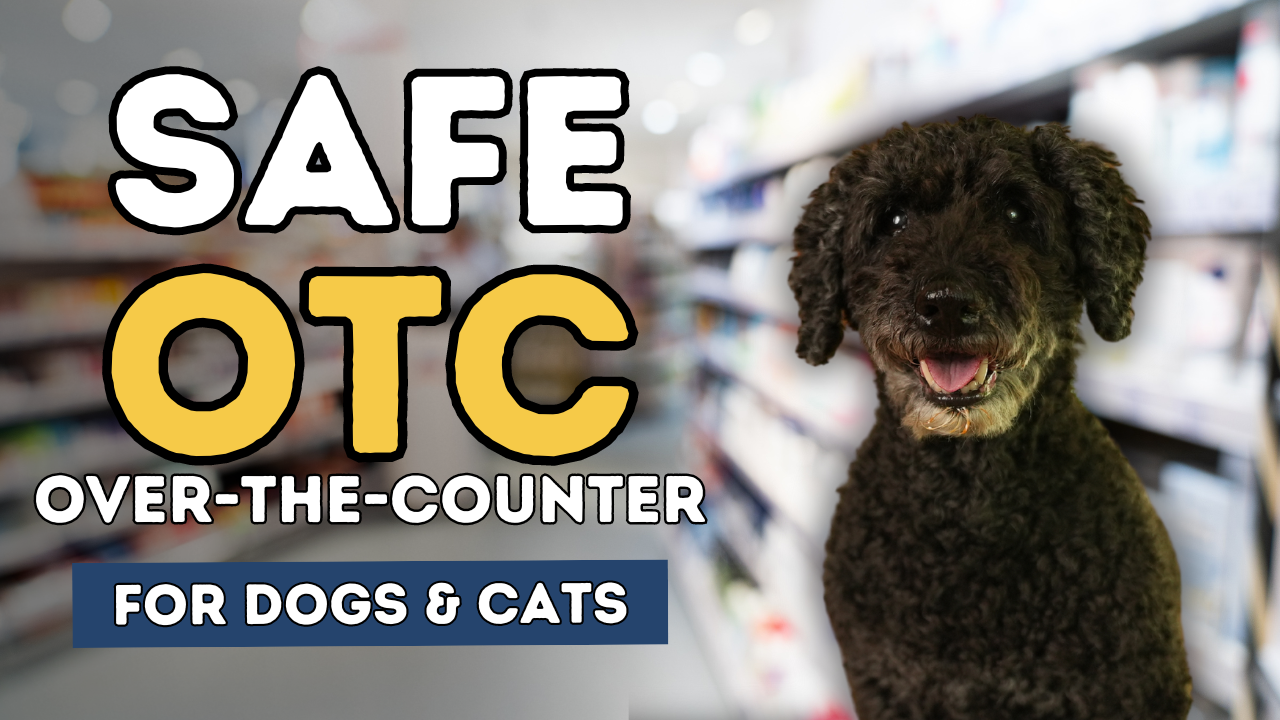Safe and Effective Over-the-Counter (OTC) Solutions for Your Pets’ Ailments

STOP!
Do NOT give anything to your pets until you ask your vet?
Really?
That is what many ‘pet professionals’ and most veterinary websites tell you to do, but what IF you can’t get in to a clinic, OR you can’t afford it?
In veterinary practice I often suggested clients use an array of human medications for their pets, so in fact what you read online is not always true 🙂
A former client is going travelling with his cats, and asked if there are ANY safe OTC meds he could use. When I travelled with my cats I always used Gravol, finding it to be safe and pretty effective keeping them slightly sedated.
When Pippi was itchy with a Hot Spot, I have her a dose of the new antihistamine Ceterizine, which worked well while the topical Tea and Aspirin kicked in.
So yes the OTC meds can be very helpful (and gasp safe!) We have an array of supplements that are very safe, and extremely beneficial for many of our dog and cat’s conditions, such as allergies, arthritis, and asthma.
Tula (pictured below!), gets one supplement in particular every day to help manage her arthritis, and also prevent some of the more common dog diseases, such as cancer.
It has MULTIPLE ingredients for arthritis, allergies, gut health and immune support.
It’s our ADVANCED Canine Formula: Dr Jones’ Ultimate Canine ADVANCED PLUS Health Formula

For our Feline friends, our Cat Supplement has received rave reviews for helping cats stay healthy: benefits for joint support, gut health, organ function, urinary tract system and immune support. PLUS most cats really like it!
Dr Jones’ ULTIMATE Feline Health Formula



12 Human Medications Safe and Effective for Dogs and Cats
As a practicing veterinarian, I often encounter pet owners seeking safe ways to care for their pets at home, especially when veterinary visits are challenging. Over my years of practice, I’ve found several human medications that are not only safe but also highly effective for treating common ailments in dogs and cats. Here’s a guide to what you can consider from your medicine cabinet to help your pets.
1. Pepcid (Famotidine)
This antacid is particularly effective for cats experiencing nausea and dogs suffering from acid reflux. It’s commonly used in cats with kidney disease. The recommended dosage is 2.5mg per 10 pounds of body weight, administered twice a day, or a quarter of a 10mg tablet.
2. Cortisone Cream
Human topical steroid creams can alleviate inflamed or irritated skin. For most cases, a 1% corticosteroid cream applied twice daily for up to 14 days can be beneficial, especially for treating hot spots in dogs.
3. Gravol (Dimenhydrinate)
Gravol is excellent for dogs and cats that experience vomiting or get car sick. It’s particularly useful for travel. The appropriate dose is 12.5mg per 10 pounds of body weight twice a day, which is about a quarter of a 50mg tablet.
4. Polysporin for Pink Eye
The active ingredients polymyxin and gramicidin in Polysporin have proven safe and effective for animals with conjunctivitis, characterized by red eyes. Treatment involves applying two drops four times a day for 5-7 days.
5. Canesten/Monistat
These antifungal creams effectively treat yeast infections in pets, particularly ear infections in dogs and ringworm in cats. For ear infections, apply about a quarter inch of cream into the ear twice daily for 7-10 days. For ringworm, apply the cream to the affected areas twice daily for 21 days.
6. Reactine (Cetirizine)
This newer generation antihistamine is safe for dogs and cats and often more effective than older types like Benadryl. It’s excellent for treating allergies and acute itching, such as hives. A typical dose is 5mg per 10 pounds once daily.
7. Chlorhexidine Antiseptic Flush
Chlorhexidine, a surgical scrub, effectively removes bacteria from the skin. It’s crucial for treating bite wounds or infections, potentially preventing them from developing into abscesses. The recommended usage is flushing the wound 2-4 times daily for 3-5 days.
8. Aspirin (For Dogs Only)
Aspirin can be used to alleviate acute pain in dogs not already on other pain medications or steroids. The dosage is 325mg (one regular strength tablet) per 40 pounds twice daily. It should never be given to cats.
9. Tea and Aspirin
A home remedy for dogs involves dissolving a regular strength aspirin in a cup of strong black tea and applying it topically four times a day to treat hot spots or surface skin infections. This is for dogs only.
10. Miralax
Miralax is an effective treatment for constipation in both dogs and cats. The typical dosage is a quarter teaspoon per 10 pounds of body weight, administered once to twice daily.
11. Preparation H
This medication is used to reduce inflammation and shrink blood vessels, making it helpful for treating paw wounds or anal gland inflammation in pets. Apply it topically twice daily, with most wounds healing within about two weeks.
12. Tissue Glue
For minor, bleeding wounds such as pad cuts, tissue glue can be very effective. Apply 2-4 drops directly into the wound, pinch the edges together, and apply pressure until the bleeding stops.
Closing Thoughts
In times when accessing veterinary care is difficult, these over-the-counter medications can provide significant relief and treatment for your pets. Always remember, however, that keeping your dog or cat healthy with regular preventive care is crucial. Supplements like my Ultimate Canine Advanced Plus Health Formula for dogs and the Ultimate Feline Health Formula for cats can help maintain their overall health and wellbeing.


Need home remedy for papilomma wart growth on senior dog at base of tail. Banking soda paste?
Was wondering if it’s ok to just give dog monistat without black tea?
Monistat (Canesten) is effective for treating yeast infections in pets, such as ear infections in dogs or ringworm in cats. It can be used without black tea, especially for localized treatments like ear infections. For ear infections, you would apply a small amount of cream (about a quarter inch) into the ear twice daily for 7-10 days. For ringworm, apply it to the affected areas twice daily for 21 days.